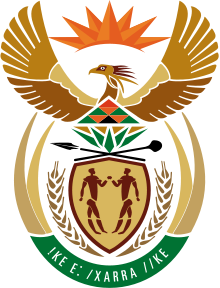- Ninth Amendment of the Constitution of South Africa
-
Constitution Ninth Amendment Act of 2002 
Act to amend the Constitution of the Republic of South Africa, 1996, in order to regulate the allocation of delegates to the National Council Provinces in the event of changes of party membership, mergers between parties, subdivision of parties or subdivision and merger of parties within a provincial legislature; and to provide for matters connected therewith. Enacted by Parliament of South Africa Date enacted 19 June 2002 Date assented to 19 June 2002 Date commenced 20 June 2002 Legislation history Bill Constitution of the Republic of South Africa Second Amendment Bill Bill citation B17—2002 Bill published on 11 March 2002 Introduced by Penuel Maduna, Minister of Justice and Constitutional Development Amendments Short title amended by the Citation of Constitutional Laws Act, 2005 Repeals Effectively repealed by the Constitution Fourteenth Amendment Act of 2008 The Ninth Amendment of the Constitution of South Africa modified the scheme for the allocation of seats in the National Council of Provinces, to account for the possibility of changes in the party makeup of provincial legislatures. This was necessary because of other legislation which had been introduced to allow members of the provincial legislatures to cross the floor (move from one party to another) without losing their seats. It came into force on 20 June 2002, and was effectively repealed on 17 April 2009 by the Fourteenth Amendment.
Contents
Provisions
The National Council of Provinces (NCOP) consists of ninety members, ten from each province. Seats in each province's delegation are allocated to parties in proportion to the seats held by the parties in the provincial legislature. Before the passage of the Ninth Amendment, seats in a provincial delegation were only re-allocated when a new provincial legislature was elected, and permanent delegates were appointed for a term that lasted until the next election of the provincial legislature.
The Loss or Retention of Membership of National and Provincial Legislatures Act, 2002, which was enacted at the same time as the Ninth Amendment, purported to allow members of the provincial legislatures to cross the floor at certain times without losing their seats. The Ninth Amendment consequentally modified the constitution to provide that, if such floor-crossing occurs in a provincial legislature, then the seats in that province's NCOP delegation must be reallocated according to the new makeup of the legislature, and also that permanent delegates' terms of office expire when such a reallocation happens.
Legislative history
The amendment was introduced to Parliament as the Constitution of the Republic of South Africa Second Amendment Bill, part of a package of four bills dealing with floor-crossing. The others were the Constitution of the Republic of South Africa Amendment Bill, which became the Eighth Amendment, the Loss or Retention of Membership of National and Provincial Legislatures Bill, mentioned above, and the Local Government: Municipal Structures Amendment Bill, which dealt with consequential effects of floor-crossing in municipal councils.
The bill was initally passed by the National Assembly on 11 June 2002 with 280 votes in favour, more than the requisite two-thirds majority.[1] It was then passed with amendments by the NCOP on 18 June, with all nine provinces voting in favour.[2] The amendments were approved by the National Assembly on 19 June,[3] and the bill was signed by President Thabo Mbeki on the same day. It came into force on the following day, at the same time as the other three floor-crossing acts.
On 4 October 2002, in the case of United Democratic Movement v President of the Republic of South Africa and Others, the Constitutional Court declared the Loss or Retention of Membership Act to be unconstitutional. This judgment had no effect on the Ninth Amendment, which remained in place notwithstanding that there could be no floor-crossing in the provincial legislatures. On 20 March 2003 the Tenth Amendment came into force, constitutionally enabling floor-crossing in national and provincial legislatures.
The changes made by the Ninth Amendment were repealed on 17 April 2009 by the Fourteenth Amendment.
Formal title
The official short title of the amendment is "Constitution Ninth Amendment Act of 2002". It was originally titled "Constitution of the Republic of South Africa Second Amendment Act, 2002" and numbered as Act No. 21 of 2002, but the Citation of Constitutional Laws Act, 2005 renamed it and abolished the practice of giving Act numbers to constitutional amendments.
References
- ^ Republic of South Africa, Parliamentary Debates, National Assembly, 11 June 2002, page 134.
- ^ Republic of South Africa, Parliamentary Debates, National Council of Provinces, 18 June 2002, pages 93–96.
- ^ Republic of South Africa, Parliamentary Debates, National Assembly, 19 June 2002, page 15.
External links
- Official text (PDF)
Constitution of South Africa Chapters 1: Founding Provisions · 2: Bill of Rights · 3: Co-operative Government · 4: Parliament · 5: President and National Executive · 6: Provinces · 7: Local Government · 8: Courts and Administration of Justice · 9: State Institutions Supporting Constitutional Democracy · 10: Public Administration · 11: Security Services · 12: Traditional Leaders · 13: Finance · 14: General Provisions · SchedulesAmendments Previous Related Constitutional Court · Chapter nine institutions · Negotiations to end apartheid · Citation of Constitutional Laws Act · Charter of Religious Rights and FreedomsCategories:- Amendments of the Constitution of South Africa
- 2002 in South Africa
Wikimedia Foundation. 2010.
